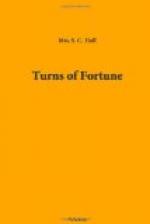The brothers, as years moved rapidly on—engaged as they were by their mutual industry and success in their several fields of action—met but seldom. It was impossible to say which of the two continued the most prosperous. Dr. Adams made several lucky hits; and having so obtained a position, was fortunate in having an abundance of patients in an intermediate sort of state—that is, neither very well nor very ill. Of a really bland and courteous nature, he was kind and attentive to all, and it was certain that such of his patients as were only in moderate circumstances, got well long before those who were rich; his friends attributed this to his humanity as much as to his skill; his enemies said he did not like “poor patients.” Perhaps there was a mingling of truth in both statements. The money he had received for his portion of the land was spent, certainly, before his receipts equalled his expenditure; and strangely enough, by the time the farmer had paid off his debt, the doctor was involved, not to a large amount, but enough to render his “appearance” to a certain degree fictitious. This embarrassment, to do him justice, was not of long continuance; he became the fashion; and before prosperity had turned his head by an influx of wealth, so as to render him careless, he got rid of his debt, and then his wife agreed with him “that they might live as they pleased.”
It so happened that Charles Adams was present when this observation was made, and it spoke well for both the brothers that their different positions in society had not in the smallest degree cooled their boyhood’s affection; not even the money transactions of former times, which so frequently create disunion, had changed them; they met less frequently, but they always met with pleasure, and separated with regret.
“Well!” exclaimed the doctor triumphantly, as he glanced around his splendid rooms, and threw himself into a chaise longue—then a new luxury—“well, it is certainly a charming feeling to be entirely out of debt.”
“And yet,” said his wife, “it would not be wise to confess it in our circle.”
“Why?” inquired Charles.
“Because it would prove that we had been in it,” answered the lady.
“At all events,” said John, “now I shall not have to reproach myself with every extra expense, and think I ought to pay my debts first; now I may live exactly as I please.”
“I do not think so,” said Charles.
“Not think so!” repeated Mrs. Adams in a tone of astonishment.
“Not think so!” exclaimed John; “do I not make the money myself?”
“Granted, my dear fellow; to be sure you do,” said Charles.
“Then why should I not spend it as pleases me best? Is there any reason why I should not?”
As if to give the strongest dramatic effect to Charles’s opinion, the nurse at that moment opened the drawing-room door, and four little laughing children rushed into the room.




